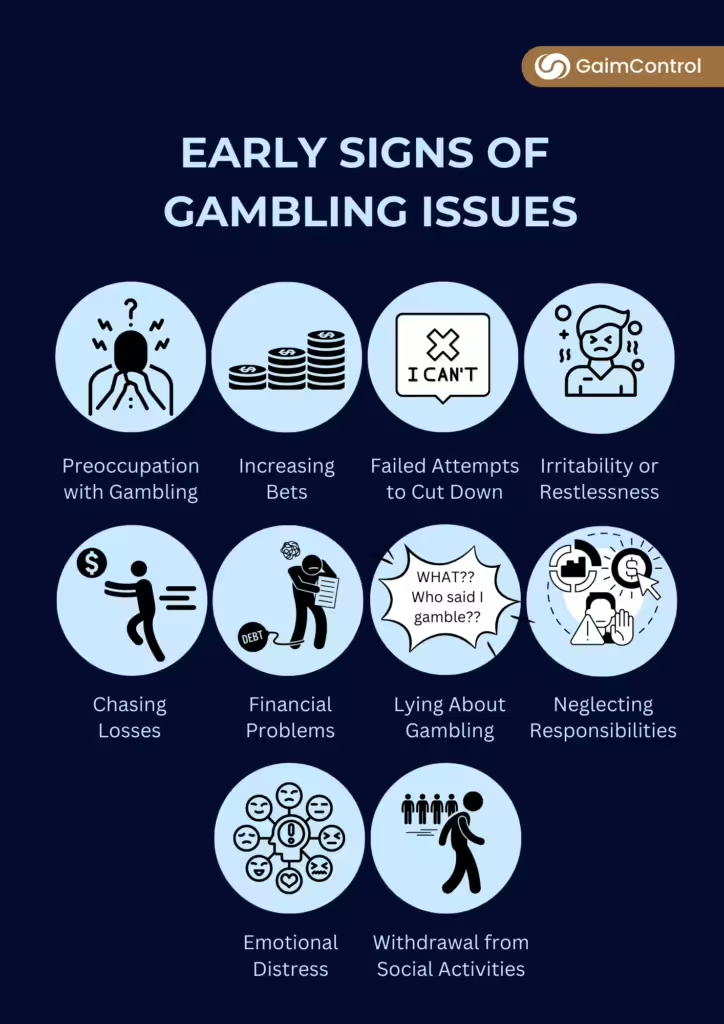It’s like a sudden twist of fate. You sit down to place a bet, and before you know it, your focus narrows, your pulse quickens, and you feel a rush of euphoria that blinds you to reality. What starts as a harmless wager can quickly escalate into a whirlwind of anxiety, frustration, and mounting debts. This isn’t just a case of bad luck; it could be a sign of gambling issues.
We all enjoy a wager now and then, but when the thrill of gambling morphs into something else, it’s crucial to recognize the signs early. Let’s delve into the ten common symptoms of gambling issues.

What deregulates your relationship with gambling?
Gambling issues arise when you can’t resist the urge to gamble, despite negative consequences. It’s not just about losing money; it’s about the behavioral and emotional impacts that spiral out of control. The core issue is an inability to manage impulses and a persistent chase for the excitement and financial rewards of gambling.
A blend of genetic, psychological, and environmental factors contributes to gambling addiction. Certain brain pathways related to reward and impulse control are altered, making it challenging to resist gambling urges even in the face of severe consequences. The need for immediate gratification and the thrill of risk can overshadow the negative impacts on one’s life.
Serotonin, dopamine, and norepinephrine play key roles in the development and maintenance of gambling issues by influencing mood, reward, and stress responses in the brain.

- Dopamine: is the neurotransmitter most directly associated with the reward system and pleasure. The anticipation of a win or the excitement of gambling triggers a surge of dopamine in the brain, creating a sense of euphoria. This rush reinforces the behavior, encouraging repeated gambling in the hope of experiencing the same reward again. Over time, the brain becomes less sensitive to dopamine, leading individuals to gamble more frequently or with higher stakes to achieve the same level of satisfaction.
- Serotonin: regulates mood, impulse control, and emotional stability. Low levels of serotonin are often linked to impulsivity and mood disorders such as depression and anxiety, both of which are common among gamblers who lost control over their gambling issues. Serotonin deficiency may lead individuals to gamble impulsively or seek out the excitement of gambling to counteract feelings of depression or low mood. In this way, a dysregulated serotonin system can make it harder for a person to stop gambling.
- Norepinephrine: is associated with the body’s “fight or flight” response and is linked to arousal, alertness, and stress. In gambling, norepinephrine levels spike during periods of excitement or stress, such as when placing bets or during high-risk gambling situations. This heightened state of arousal can make gambling more thrilling, reinforcing the behavior. Some gamblers often chase the adrenaline rush that norepinephrine provides, making it harder to disengage from this vicious cycle.
Warning Signs of Gambling Issues
Recognizing the signs of gambling issues can help us take proactive steps to become a more balanced version of ourselves. Here are ten common symptoms that only you can watch for:
Sign 1: Preoccupation with Gambling
Constantly thinking about gambling or planning your next gambling session? This preoccupation often leads to neglect of responsibilities and relationships.
Sign 2: Increasing Bets
Do you find yourself needing to wager larger amounts of money to achieve the same level of excitement? This is a usual sign of gambling issues, where the thrill of risk escalates and requires more significant financial stakes.
Sign 3: Failed Attempts to Cut Down
Have you tried to reduce or stop gambling but found yourself going back to day one? Repeated unsuccessful attempts to control gambling habits are a key indicator that you want to change your relationship with gambling.
Sign 4: Irritability or Restlessness
Feelings of irritability or restlessness, when you’re not gambling, can signify that gambling is used as a coping mechanism.
Sign 5: Chasing Losses
Do you continue to gamble to recover losses, hoping to win back money? This behavior can lead to further financial trouble and is a strong symptom of gambling issues.
Sign 6: Financial Problems
Struggling with debt or using money intended for other things to gamble? Financial issues are a common consequence of gambling issues and often require immediate attention.

Sign 7: Lying About Gambling
Have you lied to friends, family, or yourself about the extent of your gambling? Secrecy and dishonesty are often present in gambling issues, signaling a deeper problem.
Sign 8: Neglecting Responsibilities
Neglecting work, school, or family duties due to gambling is a serious sign of addiction. When gambling starts interfering with daily life, it’s crucial to seek help.
Sign 9: Emotional Distress
Experiencing feelings of guilt, anxiety, or depression related to gambling? Emotional turmoil often accompanies gambling issues, impacting overall mental health.
Sign 10: Withdrawal from Social Activities
Withdrawing from social events and hobbies to spend more time gambling indicates a significant problem. Gambling issues can isolate individuals from their support networks.
Learn about your brain and how your psychological state affects your relationship with gambling with us!
When it comes to gambling, we think it is important to be equipped with the knowledge of how it can affect you and your brain. We use science and proven techniques to educate ourselves and regain control over our relationship with gambling. Our program is designed to help you gradually reduce your gambling and tailor your journey toward a healthier and happier self.

